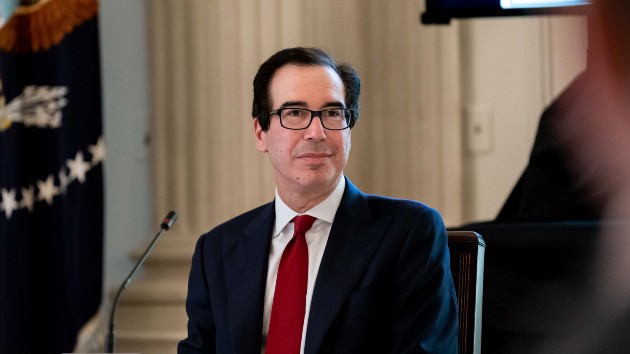By ALLISON PECORIN, ABC News(WASHINGTON) — The White House advanced a $916 billion offer on coronavirus relief Tuesday night that includes aid to state and local governments as well as liability protections for businesses, schools and hospitals, according to a statement from Treasury Secretary Steven Mnuchin.Mnuchin’s proposal comes after Senate Majority Leader Mitch McConnell earlier Tuesday suggested gutting something Republicans have been trying to secure — liability protections for schools, hospitals and businesses — and something Democrats wanted to include — aid to state and local governments — from a separate bipartisan proposal, threatening to derail the effort.Further complicating matters, a group of progressive Democrats penned a letter demanding that checks be sent directly to Americans.”Simply stated, given the horrific extent of the current crisis and the desperation that working families all over this country are experiencing, this proposal does not go anywhere near far enough,” the senators wrote in their letter demanding direct checks and removal of liability protections.And they have an unlikely ally: Sen. Josh Hawley, R-Mo.Hawley said Monday that he’s encouraged the president to consider vetoing any coronavirus aide that doesn’t include direct checks. The Washington Post reported Tuesday that the White House is pushing Congress to consider $600 stimulus checks for Americans.Mnuchin’s offer is slightly more than the $908 billion bipartisan Senate proposal and includes both liability reform and aid to state and local governments. It repurposes remaining money from the $2.2 trillion coronavirus relief bill while drawing an additional $429 billion in Treasury funds. It’s unclear if that money would be used for direct checks to Americans, but according to sources, Republicans would back a $600 direct check.House Speaker Nancy Pelosi and Senate Minority Leader Chuck Schumer called the offer “unacceptable” in a joint statement. They said it cuts funding allocated in the bipartisan bill for unemployment insurance.”While it is progress that Leader McConnell has signed off on a $916 billion offer that is based off of the bipartisan framework, the President’s proposal must not be allowed to obstruct the bipartisan Congressional talks that are underway,” their statement reads. “Members of the House and Senate have been engaged in good-faith negotiations and continue to make progress. The bipartisan talks are the best hope for a bipartisan solution.”While many members haven’t yet reacted to Mnuchin’s proposal, it’s possible it could falter on the same sticking points slowing the bipartisan proposal: the liability protections and state and local funding.”What I recommend is we set aside liability and set aside state and local and pass those things that we can agree on, knowing full well we’ll be back at this after the first of the year,” McConnell said Tuesday.McConnell’s move off liability protections, once a red line for him, marks a significant concession from the leader. But his proposal is conditional on Democrats giving up the $160 billion in aid to state and local governments and it is going nowhere fast.Schumer threw cold water on McConnell’s proposal earlier Tuesday. He said Democrats have been contacted by local leaders who say they will soon be forced to lay off essential workers like firefighters, police officers and sanitation workers without an infusion of cash from Congress.”Within the Senate many Republicans support state and local funding,” Schumer said. “State and local funding is bipartisan unlike the extreme corporate liability proposal Leader McConnell made which has no Democratic support.”Sen. Joe Manchin, a member of the bipartisan group, was frustrated by McConnell’s suggestion.”If he keeps throwing this and that and everything else and whatever, they don’t want a deal,” Manchin said. “Mitch doesn’t want a deal.”Despite squabbles at the leadership level, the bipartisan group continued their work in earnest, meeting in small groups Tuesday evening as they inch toward hammering out remaining areas of contention.On the two main provisions causing trouble, gradual progress is being made.”We’re moving forward,” Manchin said. “We’re not giving up.”Sources told ABC News that members are nearing an agreement on state and local aid. Republicans have opposed the measure out of concern that some states that do not need assistance will receive funds, while others may receive bailout money to be used for expenses incurred unrelated to the pandemic. The group is quietly working on the details concerning who will qualify for federal funds and how those funds will be managed.The group is also moving towards consensus on liability protections which were initially opposed by Democrats due to concerns that workers would not be protected. The bipartisan group is considering implementing a six-month moratorium on lawsuits to give states time to implement their own policies. But the thorniest piece of this complex issue appears to be dealing with retroactive protections for incidents that may have already occurred.Copyright © 2020, ABC Audio. All rights reserved.












